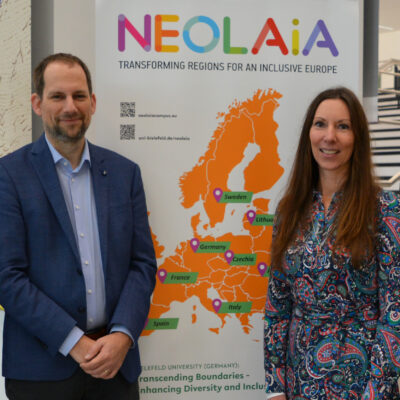Sociologist Dr Sebastian Sattler talks about the spread and social impact of neuro-enhancement in the new research_tv interview. Neuro-enhancement refers to methods designed to make the brain more efficient. Sattler is leading the largest representative study to date on the spread and causes of neuro-enhancement in Germany. He is also part of the management team of an upcoming conference on interdisciplinary perspectives on neuroenhancement at the Center for Interdisciplinary Research (ZiF) at Bielefeld University.
We found out that about 70% of respondents use substances to increase their performance. This means concentration, memory, and other cognitive functions.
[How common is brain doping?]
Research project on neuro-enhancement: People actually already have always tried to increase their performance in some form or other. Lots of technologies are actually proof of this, that people always try to somehow improve or maintain their performance or maintain it. The phenomenon we are looking at now is also one of these phenomena. So people are now trying by means of stimulants, for example, to increase their concentration, their memory, their attention. But sometimes they only do this in the hope that it will do something. It’s not necessarily that you swallow what you swallow, really notice at the end, in the sense of an increase in performance.
[What substances do people take to improve performance?]
So first discussions on the subject start with the topic honey. So people have, I think, to perform athletically or higher performance, they have honey or honey-like substances, to dope themselves in a certain way. Now, with our topic cognitive enhancement, it’s often about caffeine, for example, but also tea, for example, can also boost performance. But it goes to cocaine or others, also illegal substances.
[Why are substances taken to increase performance?]
We can definitely see that something like a desire for status, but also status anxiety and competition all together influence the willingness to take substances. In other words, this is already a phenomenon, that people are prepared of these three phenomena to accept risks, to accept health risks. And that is of course a problem, that due to external constraints feel compelled to partly take medication, that may affect their health in the medium or in the long term.
[How do others react to consumption?]
There are several occupational fields, where there is increased stress and increased pressure to deliver well. Doctors, for example, are such an appointment. And we wanted to know, for example: How do people rate it when a doctor takes something like this before an operation? a surgery? And then we found out that it morally very negative and that also reduces the willingness to be treated by such a person.
[How useful is the misuse of medicines?]
So there are a few studies now, that also investigate, How do these remedies work on healthy people? Because then the important question is actually, They were actually developed for people for treatment, ADHD or dementia, for example. And the question is, how does that affect in healthy people? And there are some studies that show that, this does not actually have the desired effect. Other studies show that there are rather medium effects. In other words, the people who take it, they actually often overestimate what the substances can really do.
In the interview, Sebastian Sattler reports that many people deliberately use substances such as caffeine or medication to improve their cognitive performance. ‘People have always tried to improve their performance in some way,’ he says. This tendency extends to the use of illegal substances such as cocaine.
But what about the acceptance of such drugs in demanding professional fields such as medicine? How does consumption influence trust in professionals? Sebastian Sattler discusses this in the research_tv interview.





